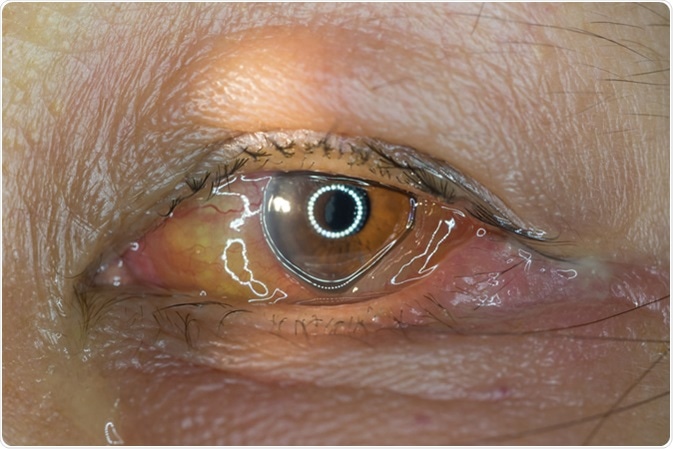The conjunctiva of the eye is a layer of tissue that overlays the eye and the inside of each eyelid. It contains the lacrimal glands and contribute to the formation of the tear film, which is necessary to maintain the health of the eye epithelium.
Inflammation of the conjunctiva is known as conjunctivitis. There are a number of types of conjunctivitis, including viral conjunctivitis, bacterial conjunctivitis, allergic conjunctivitis and irritant conjunctivitis. Most cases of conjunctivitis are self-limiting, but treatment is sometimes necessary to prevent complications.

Close up of eye infection during eye examination. Conjunctivitis, episcleritis. Image Credit: ARZTSAMUI / Shutterstock
Bacterial Conjunctivitis
Bacterial conjunctivitis is most commonly caused by species of staphylococcus and streptococcus. Haemophilus influenzae, pseudomonas species, and E. coli may also cause cause conjunctivitis. Bacterial infection may be primary, or secondary to a foreign body, dry eye, trichiasis, or lacrimal mucocele.
Gram-positive infections like Staphylococcus aureus and Streptococcus pneumoniae are relatively less severe and self-limiting. Gram-negative infections like Pseudomonas, Serratia marcescens, Haemophilus influenzae, Moraxella, C. trachomatis, and N. gonorrhoeae can be severe with potential complications leading to blindness. Typical treatment is with broad-spectrum antibiotics in the form of eye drops or ointments.
Viral Conjunctivitis
The most common virus that causes conjunctivitis is adenovirus. Herpes simplex virus, varicella-zoster virus, picornavirus, poxvirus, and human immunodeficiency virus (HIV) are other viruses that can cause conjunctivitis. Conjunctivitis can rarely occur in systemic infections with influenza virus, Epstein-Barr virus, measles, mumps, and rubella.
Viral conjunctivitis is self-limiting and does not require treatment with antibiotics unless a secondary bacterial infection develops. Cold compresses can be used to relieve discomfort. Topical vasoconstrictors and antihistamines may relieve itching. For patients with compromised immune systems, a topical antibiotic may be indicated to prevent secondary bacterial infection.
For infections caused by herpes simplex virus (HSV), topical antiviral agents can be used.
For infections caused by Molluscum contagiosum, the inflammation will continue until the lesion is removed.
Allergic Conjunctivitis
Allergic conjunctivitis can be triggered by seasonal allergens like pollen and mold, as well as perennial allergens like dust mites. Typical signs and symptoms include pigmentation of the conjunctiva, infiltrates at the corneal-scleral margin, and cobblestones. Other allergic symptoms such as rhinitis may be present.
There is no direct treatment for allergic conjunctivitis, though cold compresses and astringent drops may help relieve symptoms. Topical steroids may be used, though they can cause complications like worsening of corneal ulcers. Antihistamine drops have limited effects. Mast cell stabilizing drugs may be effective if used long term.
Irritant Conjunctivitis
The goal of treatment in irritant conjunctivitis is to remove the source of irritation. If a foreign body is present, removal of the foreign body is a priority. In the case of a chemical splash, the eyes should be flushed with saline. Topical steroids may be indicated in some cases. Chemical burns of the eye require emergency treatment.
Prevention
Bacterial conjunctivitis can be prevented through good personal hygiene. Neonatal eye infections are sometimes acquired at birth, and are prevented through the use of antibiotic eye drops.
Viral conjunctivitis is highly contagious and can sweep through a school or community rapidly. High standards for hygiene, including the use of disposable towels, can reduce the spread of the infection.
Allergic conjunctivitis can only be prevented by preventing exposure to the allergens that trigger it.
References
- http://emedicine.medscape.com/article/1191370-overview#a1
- https://www.ncbi.nlm.nih.gov/pmc/articles/PMC1706007/
- http://emedicine.medscape.com/article/1191730-overview
- http://emedicine.medscape.com/article/1191467-overview#a4
- http://emedicine.medscape.com/article/1191370-overview#a1
- https://www.aoa.org/patients-and-public/eye-and-vision-problems/glossary-of-eye-and-vision-conditions/conjunctivitis?sso=y
Further Reading
Last Updated: Feb 26, 2019